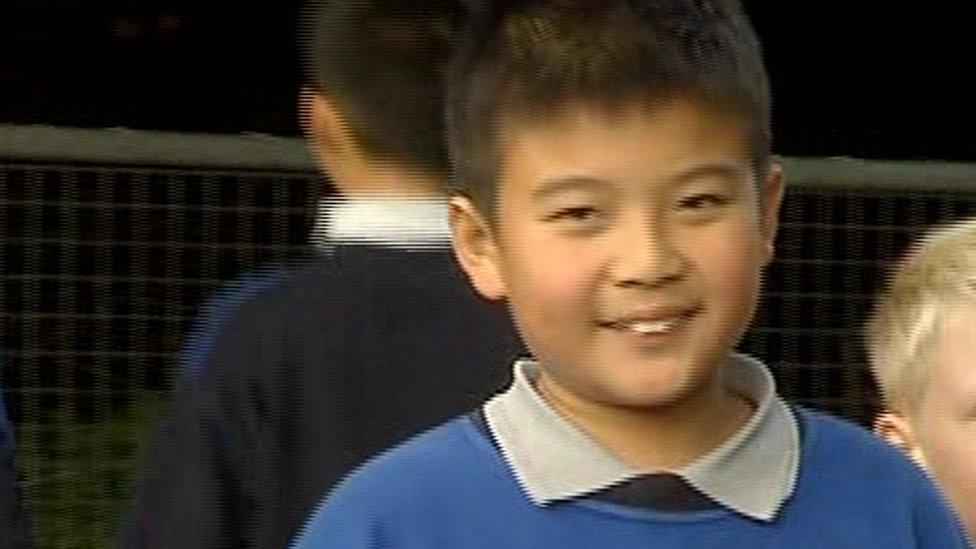Harris intervenes in Eric Zhi Ying Xue deportation case
- Published

Eric Zhi Ying Xue was born in a Dublin hospital but is not entitled to Irish citizenship
A nine-year-old boy who is facing deportation from the Republic of Ireland has won the support of an Irish government minister in his bid to stay.
Eric Zhi Ying Xue was born in Dublin and has never been outside the country, but is not entitled to Irish citizenship due to a 2004 law change.
He has been threatened with deportation to China along with his mother, who came to Ireland illegally 12 years ago.
Health Minister Simon Harris has now intervened on "humanitarian grounds".
"Quite frankly, Eric is Irish," Mr Harris told ┤¾¤¾┤½├¢ News NI.
"He was born here, goes to school here and has never lived anywhere else.
"This is his home. This is his country. I really hope common sense can prevail."
Minister Simon Harris said he had "made representations" to his government colleagues
Eric's situation arose due to .
At the time, the government said the law had to be tightened to stop women travelling to Ireland to exploit a legal loophole which entitled their Irish-born children to an EU passport.
Mr Harris represents Wicklow in the Dáil (Irish parliament).
He confirmed he had "made representations" to his government colleagues in the Department of Justice and Equality in relation to Eric's deportation.
"I have appealed for Eric to remain in Ireland on humanitarian grounds," the health minister added.
Residency battle
The intervention followed a high-profile campaign by Eric's school to prevent their 4th Class pupil being deported.
Staff at St Cronan's National School in Bray, County Wicklow, raised concerns that Eric would have "no access to China's health or education systems because he is not a Chinese citizen".
Due to the circumstances of Eric's birth, he has neither Irish nor Chinese citizenship.
His Chinese mother was 19 when she arrived in Ireland illegally 12 years ago and gave birth in Dublin three years later.
She fought a long battle to secure residency in Ireland, but has recently been told she will be deported along with her Irish-born son.
Eric's teachers have also pleaded with the Irish authorities to revoke the deportation order on "humanitarian" grounds and said they have been "overwhelmed" by public support.
Its principal, Maeve Tierney, said Eric was born in the National Maternity Hospital on Holles Street, Dublin, in 2009.
"He, as far as I'm concerned, is as Irish as every other boy in this school," Ms Tierney told .
"He is completely and absolutely assimilated into our society, into our school, into our whole community."
Principal Maeve Tierney said Eric is "as Irish as every other boy in this school"
In response to questions from ┤¾¤¾┤½├¢ News NI, a spokesman for the Irish Department of Justice and Equality said it "does not comment on individual cases".
'System abuse'
The Republic of Ireland was once the only country in the EU that automatically granted citizenship rights at birth, meaning any child born on the island of Ireland was also entitled to EU citizenship.
The right to Irish citizenship was guaranteed under the Good Friday Agreement, which was signed by the British and Irish governments in 1998.
In 1999, only 2% of babies born in the Republic of Ireland had non-national parents but .
In 2004, the then Taoiseach (Irish Prime Minister) Bertie Ahern and his government argued that Ireland's lone stance on citizenship was producing abuse of the system.
The campaign was supported by Dublin's main maternity hospitals, which warned more and more non-EU women were arriving at their doors in the latter stages of pregnancy, even in the early stages of labour, and often carrying no medical records.
Irish voters overwhelmingly supported the ending of automatic citizenship rights, with 79% in favour of tightening the law.